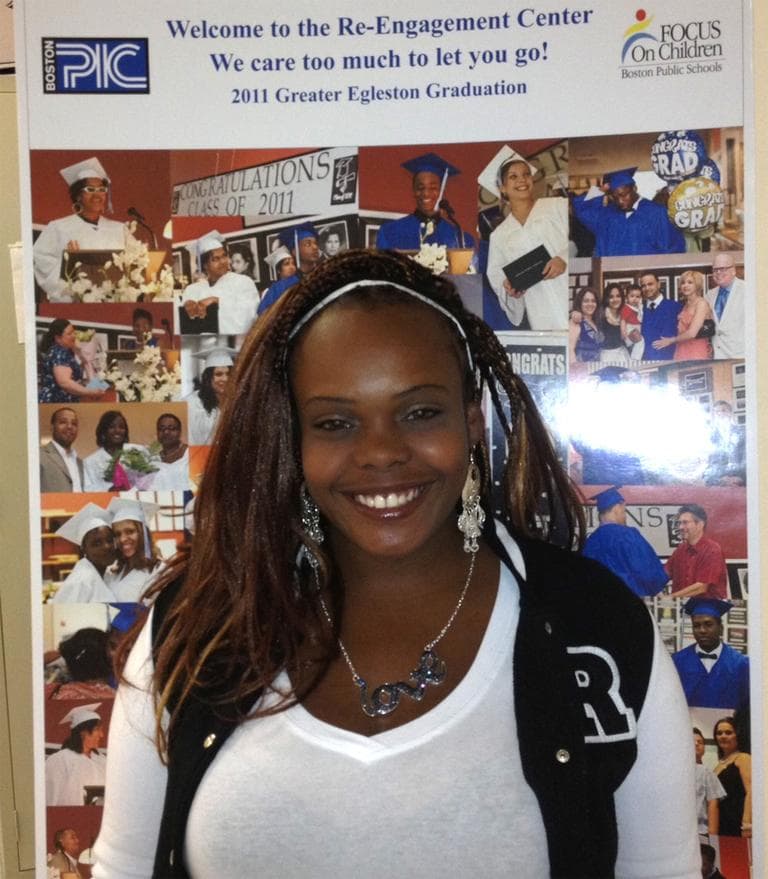Advertisement
Boston Center Helps Dropouts Get Back On Track
The start of a new academic year is often a painful reminder for the 1,100 or so students who drop out of high school in Boston every year.
Dropouts cite three main reasons for leaving: they fall too far behind, have problems with school, or have overwhelming personal obstacles. But the Boston Public Schools' Re-Engagement Center in Roxbury is now clearing a path back to their diploma.

Life Without A Diploma
Every person who walks into the re-engagement center to ask about completing high school is required to watch a video. It's a reality check.
"Without your diploma you're going to earn less than $1 million over your lifetime. But if you graduate from high school, you will earn $500,000 more," says Marvin Moore in the video. Moore is one of two dropout recovery specialists who sits down with every former student looking to come back. And he doesn’t sugarcoat life without a high school diploma.
On a recent day in the center, he talked with one former student, showing her what it’s like to live off a low-wage job.
"What you see here, this is the cost of living in Boston on your own, with no subsidies, no MassHealth, no Section 8 — none of that stuff, just you on your own," Moore said. "A decent one bedroom apartment is how much?"
The young woman, who said she was too embarrassed to offer her name, gave a big sigh halfway through the talk. Then Moore pulled out her transcript, which shows she spent three years in ninth grade. When she regularly cut school, she got Fs. But when she attended class her grades improved — an A, two Bs and three Cs.
Advertisement
"I can tell you are a bright girl, but I bet you didn’t even apply yourself, you were just going through the motions," Moore said.
Moore speaks from personal experience. He was a dropout who later got his diploma. Most of the people he now counsels have never seen their academic transcript and have no idea how close or how far they are from graduating. But many have passed the 10th-grade MCAS requirement. All they need is some way to get back on track.
Getting Positive Results
The re-engagement center doesn't offer classes. It's more of a free clearinghouse for former students to find the resources they need to resume school or get into an alternative program.
"Because we know that when a student has a clear picture of who they are and where they are in relationship to earning that diploma, it really puts things into perspective for them," said Gail Forbes Harris, the center's director. "When you have that, coupled with a group of people really passionate about the work they do for young people, it really allows them to develop that kind of trust."
That trust is paying off with results. The first year the center was open, 2009, it placed 81 kids back in school, in a GED program or in online courses to make up credits. Last year the center placed 450.
"And then we are finding that people are graduating. We didn’t expect that," at least not so soon, said Kathy Hamilton, the youth transitions director at the Boston Private Industry Council, which is a partner with Boston Public Schools in the re-engagement center.
Hamilton says that in the beginning, some educators were naysayers.
"People didn’t think students would come back," Hamilton said. "They told us not to do this project when we started, that students wouldn’t want to come back, and if they did, we wouldn’t be able to help them."
The dropout rate in Boston schools has been going down, from 7.3 percent in 2009 to 6.4 percent in 2011. And the district's graduation rate has steadily risen since the center opened.
'Somewhere Along The Line They Get Dislocated'
Dominic Vozzella, the credit recovery teacher, says the students coming back work hard because the real world has hit them.
"They are fantastic students," Vozzella said. "The average student is above average in intelligence and work ethic. It’s just that somewhere along the line they get dislocated from the mainstream for whatever reason."
That's what happened to 20-year-old Johanne Louissaint. When she was a senior in high school she got pregnant with her second child and her school told her she couldn’t attend anymore. She spent the next year feeling very left out. Then she came to the center.
"It gave me hope cause I have two kids and I thought that I didn’t have no hope," she said. "I wasn't going to go back to school no more; I was going to be a nobody."
As Louissaint clicked her pen nervously, she recalled how she cried when she found out she could finish her degree by taking credit recovery courses and classes at Boston Adult Technical Academy. On this day, she was heading to her first day back at school.
"This morning my son was like, 'Why you have your book bag on?' and I’m like, 'Because I’m going to school, just like you I’m going to get an education.' That was very fun." She smiled.
Louissaint was getting a ride to school with Forbes Harris, the center's director.
"For me it’s like me taking my child to school for the first time," Forbes Harris said. "It doesn’t matter when you go back; what’s more important is that you go back and you finish."
It's this personal touch that center staff and students say eases the path back to school. It's a one-of-a-kind center in Massachusetts, but similar outreach programs around the country are also showing good results.
This program aired on September 25, 2012.